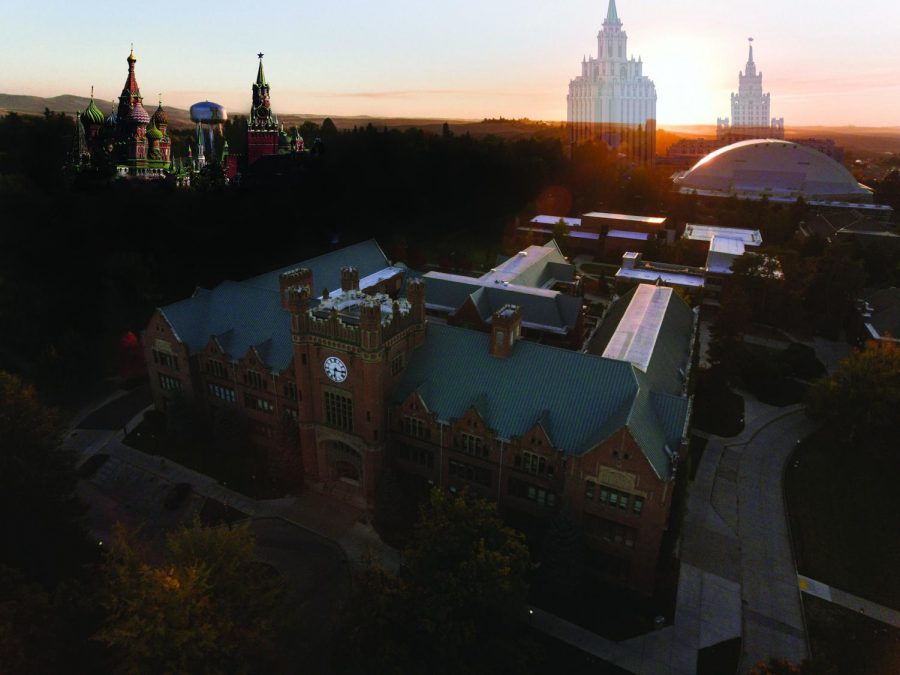SATIRE: Moscow is a town of sleeper KGB agents
Moscow, Idaho has more in common with it’s Russian cousin than we think, it has the KGB
Don’t let this sleepy town in the Palouse fool you. If we hadn’t won the Cold War, Moscow would still be the center for the KGB’s strongest sleeper cell
February 19, 2020
Since the collapse of the Berlin Wall, it seems that the United States won the war against communism. The once-powerful empire of the USSR was toppled by a cowboy actor from the 1950s and the pervasive influence of McDonalds. A moment of silence for the passing of Mother Russia was had, and then “Fight Club” came out, and we all kinda forgot about Soviet Russia. (Unless you lived in the Balkans or Afghanistan or Grenada or Vietnam or-)
But it seems that our victory over the filthy Communists was less assured than it seemed at the time. To understand why, we must look over our very own Washington/Idaho border, home to the best Mexican food I’ve had in a while, and the University of Idaho Vandals. The answer seems too obvious and on the nose to even be true, but regardless, the facts remain: Moscow, Idaho, was the secret base for deep-cover KGB operatives during the Cold War.
“It’s true,” says Vladimir Dostoyevsky, the owner of Putin’s Pastries, a Moscow bakery. Dostoyevsky developed the world-famous Red Scare, a donut with an “explosive” strawberry jelly surprise inside its flaky core. In addition to his experience as a pastry chef, Dostoyevsky was a deep-cover Russian operative, tasked with determining how Arnold Schwarzenegger didn’t die of a steroid-related coronary while filming “Predator.”
“My mission was to find out how he kept his pecs, as you Americans call them, in such pristine condition,” Dostoyevsky said. “You could bounce a quarter into orbit off those bad boys. If we could have figured that out, Russia’s super-soldier program would have been unstoppable. Typical Americans, you have the secret to physical perfection sitting in front of you, and you cast him in ‘Jingle All the Way.’”
Established in 1957 by Soviet operatives disguised as wheat farmers, Moscow has been essentially a cover for all sorts of nefarious USSR projects since its inception.
“Nuclear secrets, biological warfare, Madonna, we had a hand in it all,” said former KGB lieutenant Ivan Solzhenitsyn. “We were so devoted to the illusion, that we actually improved the property value of the Palouse area, just to preserve our impression as hard-working Americans.”
Solzhenitsyn’s cover was an organic beet farmer, selling at farmer’s markets and to local restaurants.
“I chose beet because it is red, like Soviet colors. It is glorious, yet unassuming, like Russia,” Solzhenitsyn said. “I do not know of this Dwight Schrute so many people compare me to. I do my job for my country, and I grow delicious beets. I have nothing more to say.”
The diligence of the undercover KGB agents to destroy American society and establish godless communism ironically ended up increasing Moscow’s reputation as one of Idaho’s more reputable small towns.
“Who’d have thought Americans like craft breweries, live music and locally grown produce?” said KGB torturer Darryn Barretsovich.
In addition to his skill for extracting state secrets (and also teeth), Barretsovich found he had a particular knack for the bass and started a local band.
“Darryn and the Trotskyites has really taken off recently,” Barretsovich said. “People seem to connect to our older hit singles ‘Gulag Blues’ and ‘Siberia Swingin’. I’ve also discovered this cool American invention called a wallet chain. What a style, it’s really fantastic.”
When the Soviet Union fell to American imperialism freedom tactics, most of the KGB members left here were nation-less and jobless.
“Mother Russia had fallen,” Dostoyevsky said. “What was I supposed to do? I tell you, the job market for a Russian spook is not great, especially since the CIA is strictly a Nazi-hiring organization only.”
Many of Moscow’s residents decided that, rather than try to rejoin their crumbling country and work as Mikhail Gorbachev’s birthmark polisher, they’d maintain the life they’d been leading, in the hopes that their country would need them again in the future.
“I keep playing the bass and brewing Darryn’s Drinkies, my craft beer, and I keep waiting to get that secret letter-drop telling me I’m back in action,” Barretsovich said, plucking out a Tool riff on his Gibson. “Until then, I riff for Mother Russia.”
With little hope on the horizon for their former undercover jobs, most of Russia’s finest have resigned themselves to a life in small-town America.
“Countries rise and fall, leaders take power and lose it, but pastries prevail,” Dostoyevsky said.
When you’re in Moscow next, make the trip to Putin’s Pastries, and ask Dostoyevsky to show you the back room, where he used to beat American CIA operatives into revealing missile codes. If you have a chance, make sure to order the “Cyanide Surprise,” a donut combo that he perfected. It’s to die for.
Jacob Hersh is a political science major from Anchorage, Alaska. He can be contacted at 335-1140 or at opinion@dailyevergreen.com. The views expressed in this column do not necessarily represent the views of The Daily Evergreen, its editors or publishers.









